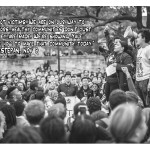Between the grassroots support that emerged from #BlackLivesMatter, the student-led organizing of cultural center reform campaigns, the Fossil Free movement, financial aid reform protests, and now the project to Unite Yale, there has been an immense growth of activism on campus. Although there have always been a handful of Yalies who were willing to throw together signs or grab a bullhorn, the momentum as of late has definitely been different. The crowds have grown; the demonstrations have gone on longer. Clearly, direct action is gaining ground at Yale, and as the activism grows, one question keeps bothering me.
Where are the cries of Black/Red/Brown Power?
Now that Unite Yale has finally brought forth the bold utterance of “student power” (hearkening back to the days of Students for a Democratic Society and the growth of the New Left in the late 1960s), maybe it’s time to bring it all back.
But why should we bring it back? In 2015, there is no war in Vietnam. There is no draft. Our President is Black. The so-called “Civil Rights Era” is long behind us. What place is there for this kind of rhetoric today?
It is in reading Stokely Carmichael’s 1966 address at the University of California, Berkeley that I find the answers to these questions. This 1966 speech is entitled, “Black Power,” and it resonates intensely today.
Are we willing to be concerned about the black people who will never get to Berkeley, who will never get to Harvard, and cannot get an education, so you’ll never get a chance to rub shoulders with them and say, ‘Well, he’s almost as good as we are; he’s not like the others’?
First and foremost, these are the kinds of questions we need to start asking our fellow Yale students. Students of color at this university have the opportunity to get Carmichael’s “Well, he’s almost as good as we are; he’s not like the others.” In the eyes of privileged society, many of us have a shot at individual power, but racism was never about individual power, and there is no way that its solution can be. Carmichael reminds his audience:
“We are oppressed as a group because we are black, not because we are lazy, not because we’re apathetic, not because we’re stupid, not because we smell, not because we eat watermelon and have good rhythm. We are oppressed because we are black. And in order to get out of that oppression one must wield the group power that one has, not the individual power which this country then sets the criteria under which a man may come into it.”
And there’s the truth of the matter. Your Yale education may save you. Your ability to code switch may save you. Growing up middle class may save you. Your parents’ education may save you. Your individual status, granted to you by a system that was only designed to oppress you in the first place, will never save your people. Only power can do that.
So we must escape being remarkable individuals. We must reject the temptation to allow ourselves to be “not like the others.” After all, when we’re walking down the street, we will be perceived as little more than our race. Even at a place we might like to call home, we might get guns pulled on us because we “fit the description.”
Through our racialization, we are deprived of power. By being coded as something other than “white” in the United States, we are marginalized, and our very being is delegitimized.
In “Black Power,” Stokely Carmichael and the Student Nonviolent Coordinating Committee find a solution to that delegitimization.
Who has power to make his or her acts legitimate?…[In] this country, that power is invested in the hands of white people, and they make their acts legitimate. It is now, therefore, for black people to make our acts legitimate.
Carmichael and SNCC did not wait to be taken seriously by the government. Carmichael and SNCC did not follow proper channels. Carmichael and SNCC simply decided that they had the ability to legitimize themselves. The power that gave Carmichael and SNCC their own legitimacy in the face of the opposition from the hegemonic state was Black Power.
For the American Indian Movement it was Red Power.
For the Chicano Movement it was Brown Power.
In 2015, it’s time to bring our power back.
The project of nation-building may be a lofty one, but it is one that can, and should begin with us. Even with the smallest of fights. Even here at Yale. After all, Carmichael didn’t believe that students should sit back and wait until graduation to make a difference:
I don’t think that we should follow what many people say that we should fight to be leaders of tomorrow. Frederick Douglass said that the youth should fight to be leaders today. And God knows we need to be leaders today, ’cause the men who run this country are sick, are sick. So that can we on a larger sense begin now, today, to start building those institutions and to fight to articulate our position, to fight to be able to control our universities–we need to be able to do that–and to fight to control the basic institutions which perpetuate racism by destroying them and building new ones?
Carmichael’s “today” was in 1966, but his charge retains its urgency. Can we rededicate ourselves to that fight?
by Javier Cienfuegos



